By: Hannah Kovnar, Esi Adamaley, Alexander Frankki, and Justin Melander
As global tariff policies continue to evolve- targeting key trade partners like Mexico, Canada and China- ongoing negotiations raise concerns about the ripple effects on job opportunities for young, skilled workers in the United States.
Against this backdrop, Gen Z college graduates are finishing their degrees and entering a job market marked by uncertainty. They’re confronting a higher cost of living than previous generations, often stuck in low-paying, entry-level roles- if they can find one- while trying to live independently. Many feel stalled, waiting for their turn on the so-called “wheel of fortune.”
When one is asked to picture the “American Dream”, imagery of white picket fences, a quaint house in the suburbs, and a self-made man at the front of it all might come to mind. The idea is almost always accompanied by the idea of “following your dreams,” making a career out of something that one is truly passionate about.
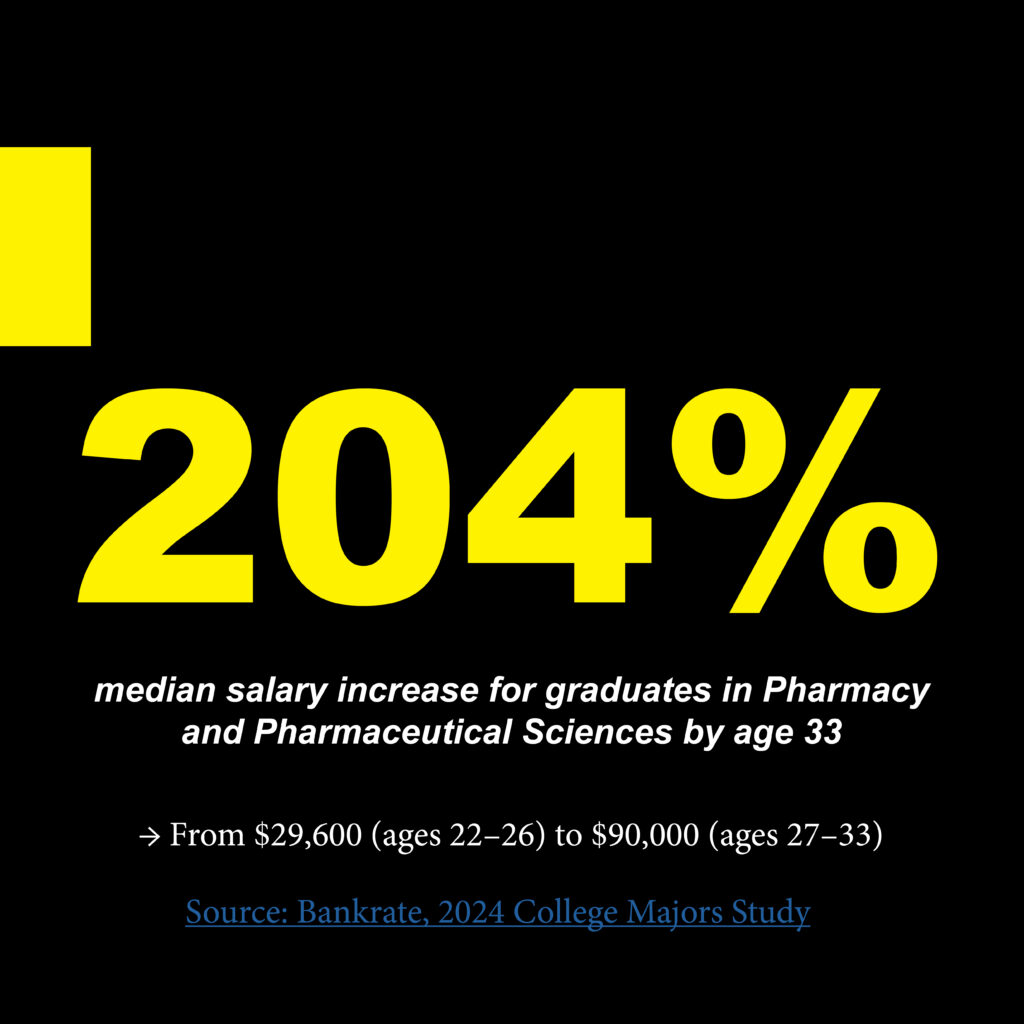
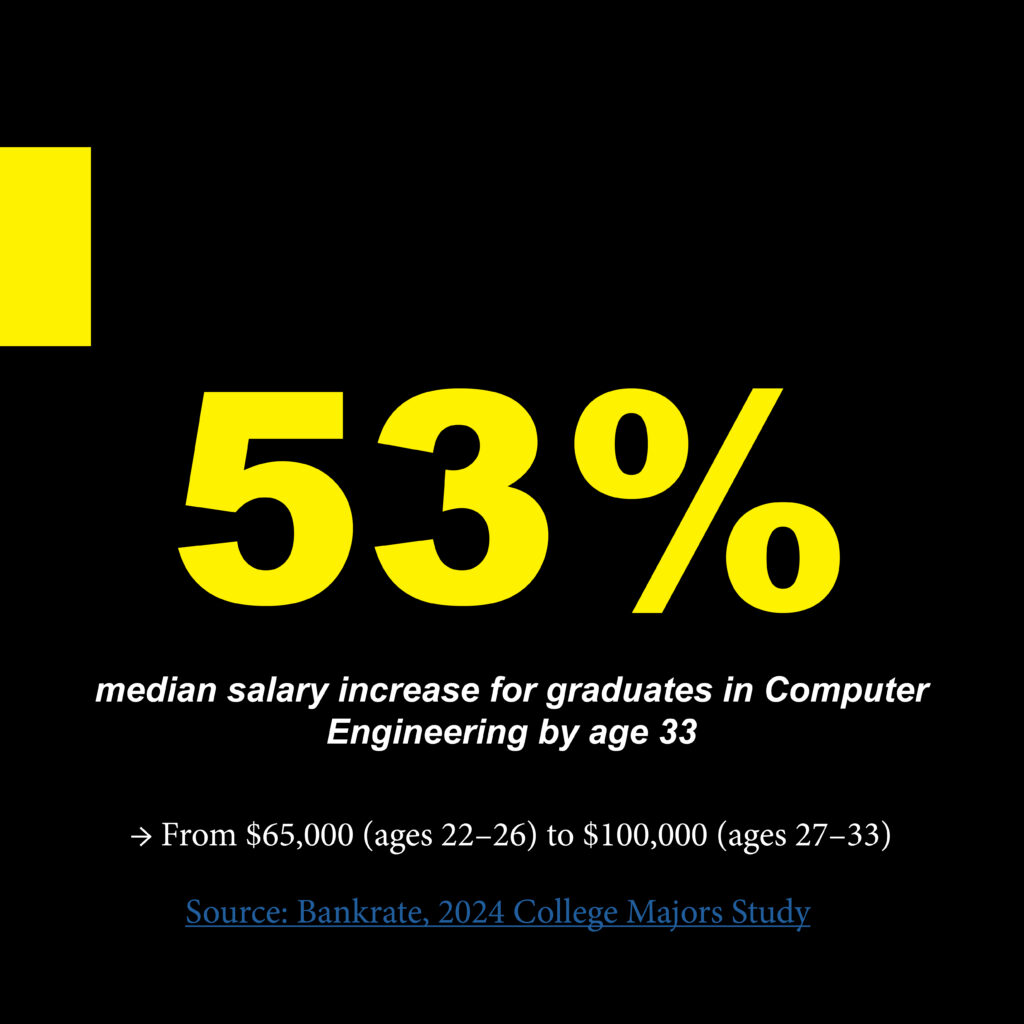
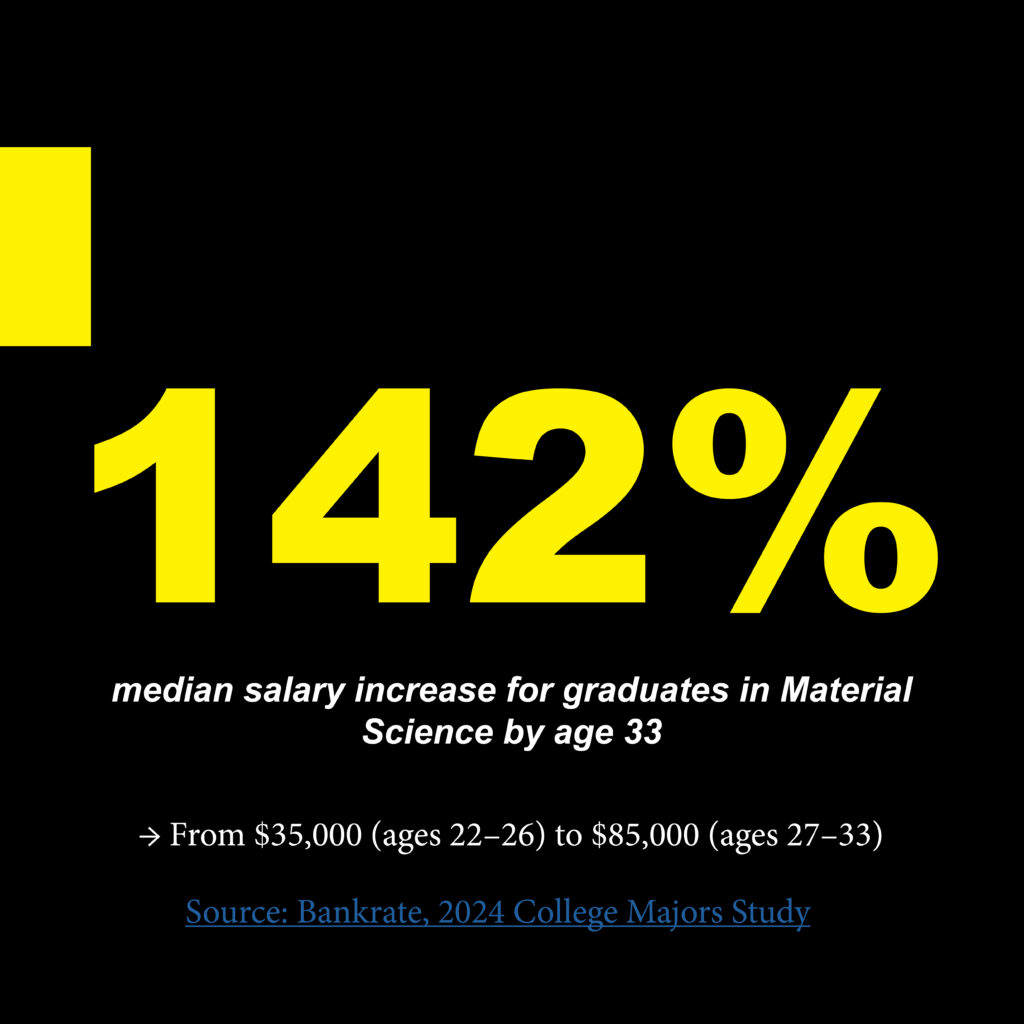
within a few years. Media design by Alexander Frankki.
However, the feasibility of the “American Dream” lifestyle is an entirely different question. Throughout the years, the American Dream has taken on various shapes and forms. A lot of the information young people have been hearing now is about how difficult it is to obtain a livable wage, a home, and build up a career. As a result, job prospects have also changed.
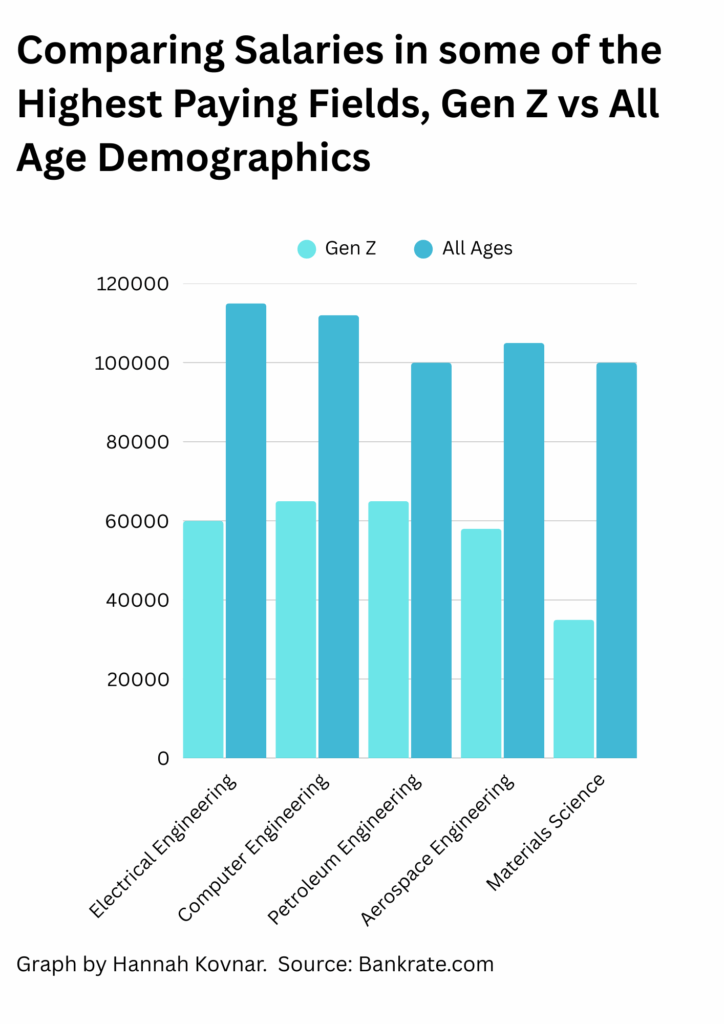
As of 2020, the average starting salary for a recent college graduate is $55,260, according to data from the National Association for Colleges and Employers (NACE). For certain majors, such as computer science, the starting salaries were much higher.
Groups with smaller salaries at the start can also experience salary growth over time, depending on the field, according to studies conducted by Bankrate. However, salary growth still varies depending on the field of study and profession, and the fact remains that many starting salaries are below the national median income. Not only that, this data does not take into account the cost of student loan debt.
With such a difficult working world, no two career stories are alike. Many recent graduates take unconventional paths in order to find their success in careers.
Dealing With Burnout and Stress
Allie Skarda, 22, has certainly had a non-traditional career path, spanning numerous career fields. She recently quit her job at the Leader Telegram, a newspaper located in Eau Claire, Wisconsin, but that wasn’t always what her plans were.
Allie Skarda as a baby playing with a Piglet toy (left) and going hiking in the mountains (right). Credit to Allie Skarda for both images, layout created by Hannah Kovnar
Growing up, Skarda’s dream was to be a pig and pickle farmer in Iowa. As she went through high school and college, however, her job of choice changed multiple times, first wanting to be a paramedic in early high school, biochemistry in late high school, and finally deciding on journalism in college.
As a journalism major at the University of Minnesota, Skarda worked three jobs, including a job in research at the Hubbard School of Journalism and a position at the Minnesota Daily student newspaper. Between her work and taking a full course load, she quickly became burned out and lacked the motivation to continue her work.
“I remember thinking, like, ‘okay I’d definitely cut off a finger not to finish this article. Or maybe two or three, or maybe my whole hand,’” Skarda said, “If I’m seriously considering if there was a world where I could cut off my hand instead of doing this, then I just shouldn’t be doing it.”
In order to avoid any worse effects on her mental health, she quit her job at the Minnesota Daily, and focused more on her classwork. When she graduated, she got her first job working for the Leader Telegram.
However, even from the beginning, she wasn’t fully certain if a journalism job was really what she wanted, given her past negative experiences working in the field while still in college. Nonetheless, she still considers the experience valuable and does not regret that decision
“To be in a new city with no connections, it wasn’t always enjoyable, but I did learn a lot and I did grow a lot as a person,” Skarda said.
Her current career plans are going to take her further west to Yellowstone National Park in Montana, where she will be working as a prep cook in the park. She is thrilled about this new trajectory in her life.
The biggest advice Skarda wishes that she could give to her past self is simple but resonant given how heavily she had overworked herself in college, “Slow the f**k down, chill out.” After several years of intense burnout and stretching herself too thin, she wishes that she had taken more time to slow down and relax during her college years, and is taking that attitude into her future careers.
Hard Work and Going With the Flow
While some find exhaustion keeping up with many occupations, school, and extracurriculars, other students are in programs where the rigor speaks for itself. Meryl Wang, a 2024 graduate of the College of Science and Engineering expressed her path in pursuing a high intensity career.
Growing up, she hoped to become a scientist. The art of science always interested her, and that passion never wavered. When she entered undergrad, she pursued chemical engineering. The cross between science and engineering appealed to her and drove her original childhood passions.
Meryl works in the Semiconductor industry as a project engineer. Business goes hand and hand with her engineering expertise, taking a bit of a turn from what she studied. When asked about the security she feels within her industry, she felt very secure and prepared.
“The degree is more secure than some degrees are these days. For my semiconductor industry, it’s a growing industry. The CHIPS Act got passed, so there’s a lot of funding.”
The CHIPS Act aims to revitalize American semiconductor manufacturing, strengthen supply chains, and boost research. Having Acts like these not only supports the industry, but also supports the people that work within it. This gave Meryl the fuel she needed to understand that her efforts are being appreciated.
“The work that I do is really rewarding and stuff I’m interested in, but what you don’t think about is how important the company culture is.
Meryl achieved a very “ideal” path. She grew up wanting to be a scientist and followed her heart all the way through. However, that isn’t the case for everyone. Some still worry about finding the perfect fit for them amidst the competitive job market.
When asked about the advice she’d give her past self, she answered very optimistically.
“Don’t worry so much about finding the perfect job because your interests will kind of guide you towards a path that you’ll end up finding something that you’ll love for you.”
Eventually, she sees herself moving beyond her current role to become something greater such as a project manager.
The Career Rollercoaster – Q&A
Kieran Hark, 22, is a student at the University of Minnesota who is graduating in May with a bachelor’s degree in psychology. Like some of the others we’ve interviewed, he doesn’t plan to continue into the professional area of his degree, but he is a rarity among his peers: he knows what he wants to do. And as it turns out, employers are eager to add Hark to their ranks, yet his relatively stable future is not immune to tribulations. In late March, his future plans were completely changed after a seemingly irrefusable job offer. However, his victory lap lasted hardly a week before he found out that offer was not what it seemed.
Q: How optimistic are you currently about finding a job after college?
A: I would say fairly optimistic, given the interview processes I’ve been through thus far. I would say the feedback I’ve gotten and the overall experience from them makes me confident in my ability to actually find a job in my field, if not get promoted from my current position.
Q: Do you have any plans in place for the future?
A: I do, I’m currently employed with Home Depot and on track to be a salaried leader within the next year and if not, I have a foot in the door for diabetes technology and medical sales and management within other companies.
Q: Does the current job market make you feel more or less excited about looking for a career in the future?
A: I would say the excitement level’s the same, I would say the determination to keep applying is definitely hindering, but I think that’s because of a combination of working while in school, so I think when school drops off that will probably resurge again.
Q: Have you ever considered changing your major for the sole purpose of finding a higher-paying job?
A: I have not, I have found that taking classes in the field of interest while not necessarily getting a major in it, is still helpful to put on your resume and use as leverage to say you’re qualified for a position.
Q: Can you give an example of a class you’ve taken for those purposes?
A: I can, I am not majoring in management, but I’ve taken five courses through Carlson in regards to foundational management techniques and situations and I can put that on my resume as “Kieran, who is a psychology bachelor or arts major with background studies in management.”
Q: What did you want to be at the start of college and how has it developed throughout College?
A: I went to Mankato originally to be a social worker, and when I transferred, they did not have a four-year social work program at the U, it was a master’s program, so I changed to psychology because it was the closest thing I could find to social work. As I saw what social workers did and looked at salaries and pay benefits, I shifted away from that and more looked at the business side of things. I’ve always been a people person, which is why I wanted to be a social worker, but I thought management is a really good equivalent to that in a profitable space where you’re just taking care of people, managing people, motivating and coaching.
Q: Was there ever a time in college when you thought you had a job lined up after college but then it fell through?
A: Yes, I actually had to turn down a job because they asked me to relocate in six months after my start date to Milwaukee and that was just not doable with the amount of student debt I’ve incurred along with the car payment I have to make.
Q: What did you want to be while you were a kid?
A: I didn’t really have a career outline when I was a kid. A lot of kids will dream of being a firefighter or something like that. I was just more focused on being a kid, I loved playing with my toys, loved being outside, I was a biker, so those were my main focuses, I never really thought about a career.
Q: What would be your ideal career?
A: I would say upper management for sure. As far as where, I feel like people get caught up on the question of where a lot like where do you want to work, why do you want to work there, I think management is a great profession to get into because it’s widely applicable across many places, Management from a retail store probably would not differ much from management in a sales space because you’re still coaching, making sure tasks are getting done, while the metrics you’re tracking success with may change, the core foundations will stay the same
Hark’s comments were edited for length and clarity.
Student Stressors
Many students have reported uncertainty about their upcoming careers. Some have even changed the direction of their dreams to adhere to a “feasible” lifestyle under American standards. We asked a small sample of undergraduate students at the University of Minnesota about their dreams versus reality.
When asked if students feel more or less optimistic about the current job market, at least 80% of students reported feeling less optimistic.
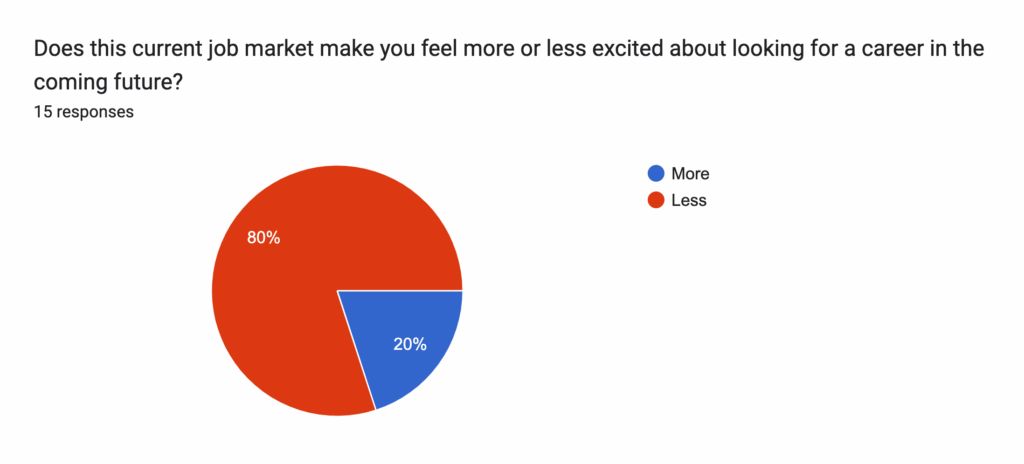
When asked why their old dreams were not pursued, many fell into two categories: Financial Insecurity and Self-Doubt; Two things that are ultimately promised in the traditional “American Dream.” More young people feel that chasing your dreams and being secure can be done simultaneously.
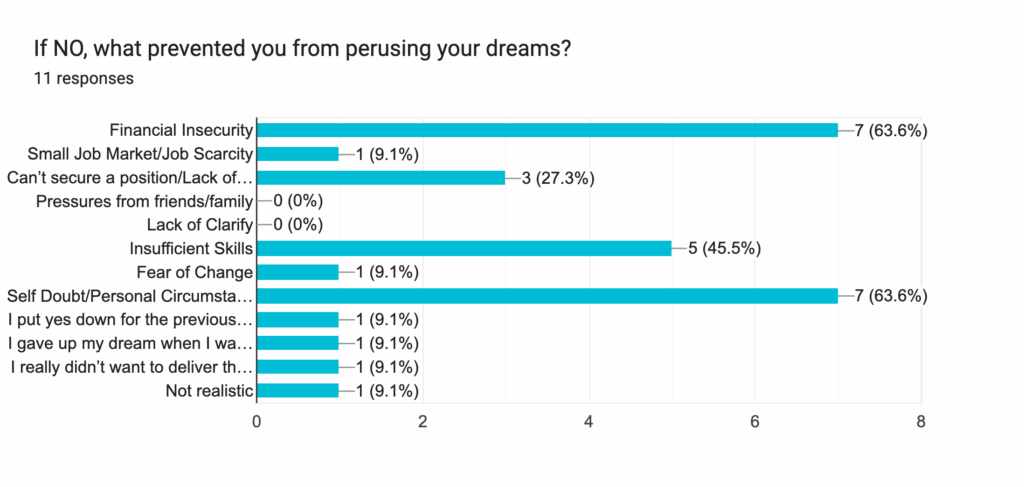
Although the market is competitive and it’s easy to feel down, many universities, including the University of Minnesota, provide resources and advice to those struggling with their career paths.
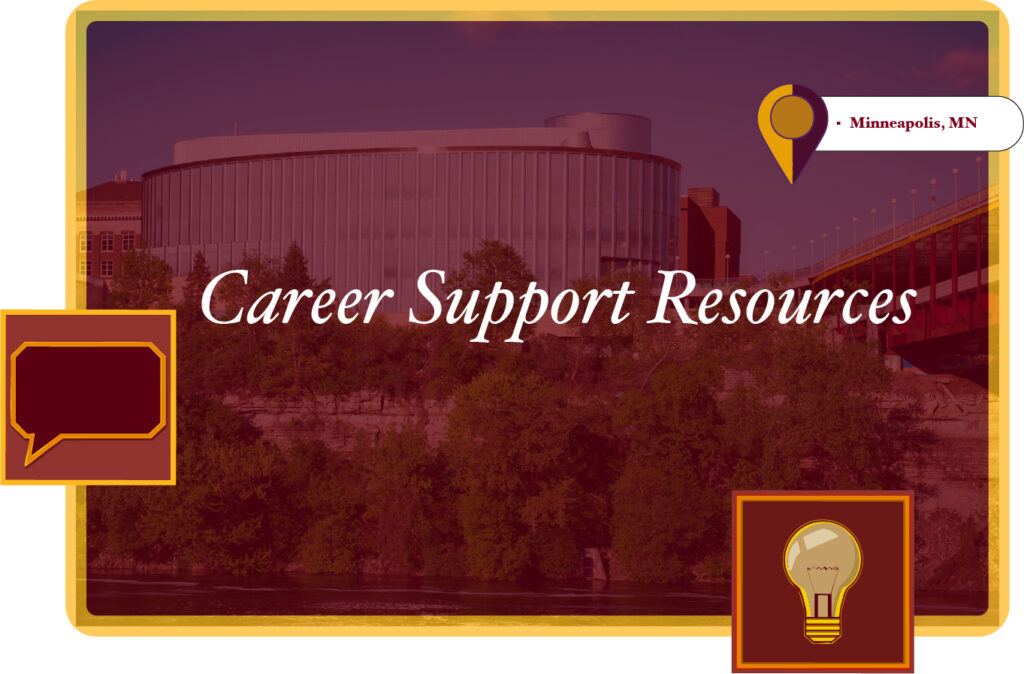
Kristi Kehrwald Adair, associate director of career coaching and student engagement for CLA Career Services, based in Bruininks Hall on the East Bank, said:
- “Both individuals and the job market change over time; that’s why we emphasize preparation that supports students throughout their lifelong career journey.”
- “A CLA education equips graduates with broad and transferable skills that remain valuable, even as industries and hiring practices change.”
- “Be proactive and pay attention to what you enjoy and find interesting in your studies and work experiences. Take advantage of the job fairs, events, and other opportunities to explore careers and build connections while you are a student.”
As bleak as it can sometimes seem for Gen Z in the workforce, there is something that many members of Gen Z are placing importance on and that is finding some level of happiness or self worth in their work, even if it was not their original first choice.
A study from a professor at Harvard Business School revealed that the most important thing for Gen Z in the workplace is happiness. According to research from Forbes, the Gen Z workforce places a far greater emphasis on happiness and mental wellbeing when compared to previous generations. Movements on social media have celebrated the importance of self care and self respect at work, something that flies directly in the face of previous mindsets around working.
According to a study by Ernst and Young, workers in Gen Z are more likely to quit their current job and move onto another, thus creating more incentive for employers to try and keep their Gen Z employees around.
As Baby Boomers move into retirement, younger people are gradually becoming the dominant demographic of the workforce, and with that comes the power to change the systems that they have been brought into. Hopefully, perhaps one day newer generations can shape the workforce into the “American Dream” they were once promised.
Horowitz, J. M. (2023, March 30). How Americans view their jobs. Pew Research Center. https://www.pewresearch.org/social-trends/2023/03/30/how-americans-view-their-jobs/ Pew Research Center. (2012, February 9). Chapter 5: Young adults at work. Pew Research Center. https://www.pewresearch.org/social-trends/2012/02/09/chapter-5-young-adults-at-work/#:~:text=Younger%20workers%2C%20ages%2018%20to,workers%2035%20years%20and%20older.
Handa, S., Pereira, A., & Holmqvist, G. (2023, March 7). The rapid decline of Happiness: Exploring Life Satisfaction among young people across the world – applied research in quality of life. SpringerLink. https://link.springer.com/article/10.1007/s11482-023-10153-4
Hanson, M., & Checked, F. (2025, March 17). College enrollment statistics [2024]: Total + by demographic. Education Data Initiative. https://educationdata.org/college-enrollment-statistics
Hanson, M., & Checked, F. (2025a, March 16). Student Loan Debt Statistics [2025]: Average + total debt. Education Data Initiative. https://educationdata.org/student-loan-debt-statistics
Molly. (n.d.). What the numbers tell us: Re-engineering the liberal arts degree – a baseline for the new economy. UNBOUND. https://unbound.upcea.edu/research-and-policy/re-engineering-the-liberal-arts-degree-a-baseline-for-the-new-economy/